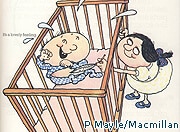Explicit sex education materials are being pushed by public bodies for use in schools with children as young as five, a new report by The Christian Institute has revealed.
The report, which has alarmed critics, comes in the midst of a coalition Government review of sex education guidance.
One of the controversial resources encourages pupils aged five and over to learn about anal intercourse, oral sex and prostitution.
Tickling
Another helps five year olds to identify the clitoris, and another tells seven-year-olds that sex is like tickling or skipping.
And an educational video produced by the BBC featuring full frontal adult nudity is being pushed to children aged as young as seven.
The resources are all recommended by public bodies, mostly local councils, for use by those primary schools that choose to teach sex education.
Judgement
These include Derby City, Devon County, Gloucestershire County, Swindon County, Worcestershire County, Hampshire County and Brighton and Hove, many of which have links to the material on their websites.
The materials – and the public bodies that promote them – were uncovered in a report published today by The Christian Institute, called “Too Much, Too Young”.
Mike Judge, Head of Communications at The Christian Institute, said: “Most parents would be deeply upset if these materials were used with their primary-aged child.
“If public bodies believe these resources are suitable for young children, there is clearly a problem with their judgement and more control needs to be given to parents.
“Parents must have the right to be fully consulted about materials. They must be able to review them, and veto any that are unsuitable.”
Destroy
These concerns were echoed by Nick Seaton, of the Campaign for Real Education, who said: “Some of this stuff could destroy someone’s childhood if it upset them too much.”
Norman Wells, director of the Family Education Trust, said: “Introducing sex education at an early age runs the risk of breaking down children’s natural sense of reserve.
“Far from being a hindrance, children’s natural inhibitions provide a necessary safeguard against sexual abuse and casual attitudes towards sexual intimacy later on.”
Pupils
The Department for Education said: “By law, schools must make sure that sex and relationship education (SRE) classes are appropriate to pupils’ ages and maturity.
“It’s down to teachers themselves to use their professional judgment in deciding this.
“Parents retain the right to pull their children out of any SRE class, outside statutory science, if they are unhappy with teaching.”
Primary
The Education Secretary, Michael Gove, recently ruled out making sex education mandatory for primary schools, leaving such schools free to use their discretion.
But the government is reviewing the advice it gives to schools about sex education.


